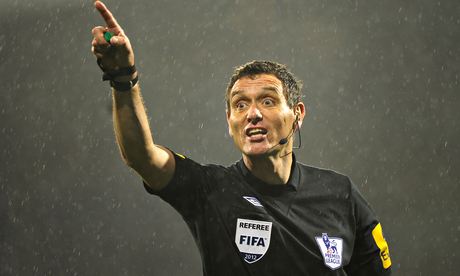Andre Marriner debacle highlights Fifa
aversion to video technology
The world governing body perceives technological assistance for referees to be as dangerously undermining as transparency

'The introduction of replays would not swiftly see Andre Marriner replaced by a robot beetling around the pitch looking for code infringements.' Photograph: Pa Wire/PA
The thing about the Luddites, apart from the thing that made them a byword, is that there was a perfectly reasonable explanation for their opposition to new technology. They didn't like it because they thought it was going to take their jobs.
That's why they took against superlooms and whatnot: because they could see those newfangled devices were going to do them out of employment, or at best relegate the odd lucky one of them to the role of machine supervisor, the 19th-century equivalent of the supermarket assistant whose job is now wearily to override the peeves and prejudices of the electronic tills which took their former colleagues' jobs, and to allow the bananas or packets of parsley to proceed expectedly to the bagging area.
Perhaps the top-down opposition to even properly trying video technology in football can be similarly explained. Of course, the introduction of replays would not swiftly see Andre Marriner replaced by a Japanese-engineered robot beetling around the pitch looking for code infringements, or even some dystopian law enforcement cyborg whose circuitry would somehow malfunction and see him kill anyone who commits a handball. No, if we somehow get to the stage of football being policed by robo-referees, you can be sure there will be other jobs for the likes of Marriner – and certainly more pressing concerns for society as a whole than whether or not a couple of seconds of delay took the shine off a London derby.
But Fifa's resistance to technology is overwhelming, and must stem from profound insecurity. Even if it can't quite put its finger on why, top brass smells a threat to its fiefdom. Hawk-Eye's officiating replay system in Dutch football is reportedly likely to be phased out, due to a lack of interest fostered by Fifa's chronic resistance to the idea. So football will lag behind almost every other major sport in its backward insistence on keeping everything just as it is.
The longer it goes on, the more it is impossible not to conclude the ruthless conservatism is born of the same tsarist impulse that is Fifa's defining characteristic. World football's governing body is autocratic, obsessed with shoring up the status quo that enriches it with minimal accountability, and pathologically averse to transparency. Thus the man in black is in some ways its earthly representative: a demonstrably fallible human who must nonetheless be invested with absolute power, because the alternative is viewed as the thin end of a wedge. Technological assistance is perceived to be as dangerously undermining as transparency. It starts with being able to question a refereeing decision; it ends with people imagining they have a right to know how billion-dollar tournaments are awarded. And that is obviously unthinkable.
When led like this, it's no surprise to find a similar authoritarianism permeating administration of the game at the national football authority level. Not that you can really call them football authorities, on account of the fact that they don't really have much authority – defined as the ability to get people to do things because they believe you have the right to tell them. Around the world, so-called football authorities are widely perceived to be either donkeys led by donkeys, or corrupt, or both. They should instead be called the football powers, because they unfortunately retain the ability to be able to tell people what to do whether or not they like it.
Our own FA and the bigger clubs may be pressing Zurich on video replays, but other forms of technology rattle them tellingly. Consider how they come down like a ton of bricks on any player with the temerity to speak his brains on social media. Ashley Cole was fined £90,000 for calling the FA a "bunch of twats". Eighty grand for an anti-Semitic gesture, ninety for impudence. I think they call that putting things into perspective. All dictators know there's nothing so dangerously undermining as a joke, meanwhile, which is why Ryan Babel was relieved of £10,000 for linking to a humorous mock-up of Howard Webb in a Manchester United strip, and some blazered old white guys took £20,000 off Carlton Cole for joshing that the England-Ghana friendly at Wembley was an immigration office trap.
Taking a step back, doesn't much of this feel part of the same thing – an instinctive, iniquitous fear of transparency or loss of control that does nothing for the game itself, only for those who run it? The single instance of openness in Fifa's purview of which I can think is the Ballon d'Or, where the normally obsessively secretive body which supposedly governs in our name allows the voting for a bauble to be made public. Thus we were permitted to see that neither Lionel Messi nor Cristiano Ronaldo voted for each other this year – a most convenient version of divide and conquer for Fifa, because it pits the junior employees against themselves, and allows the power brokers to continue operating in the shadows.
So it is not for the game's proletariat personnel to have recourse to some notional third umpire, any more than it is for its mere consumers to have information on how it is really run. Wherever those that rule football can centralise power, they will, and it is difficult to imagine that Fifa's aversion to trialling technology properly stems from anything other than reflexive terror of what it might represent.







0 comments:
Post a Comment